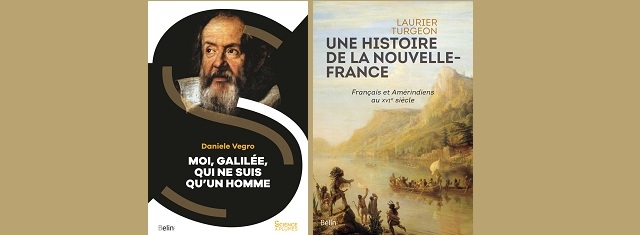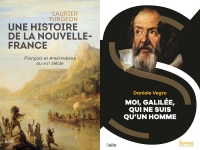Arts
2 Books : GALILEO GALILEI, ITALIAN ASTRONOMER - FRANCE & NATIVE AMERICAN
Published by BELIN Editions

(Source: Belin Editions)
USPA NEWS -
How did some Regions come to be Wealthier and more Powerful than others? The first Major Cleavage among Human Societies was between hunter-gatherer/ nomadic communities and settled, agriculturally-based communities. The Former (which all humans lived in originally) featured relatively few members in a single community, largely because of limited available nutrition...
How did some Regions come to be Wealthier and more Powerful than others? The first Major Cleavage among Human Societies was between hunter-gatherer/ nomadic communities and settled, agriculturally-based communities. The Former (which all humans lived in originally) featured relatively few members in a single community, largely because of limited available nutrition. The settled societies, on the other hand, enjoyed much larger populations. Raising livestock in large numbers and harvesting large amounts of plants enabled them to obtain vastly greater nourishment than the foragers and hunter-gatherers, and thus they become more populous.
The second major development to allow certain human societies to advance beyond others was the rise of industry and manufacturing. The Industrial Revolution occurred thousands of years after the development of agriculture, beginning in the 18th century and becoming consolidated in the 19th century. The Industrial Revolution consolidated the rise and power of the merchant and business class, which had been gradually building in the western world for several centuries to that point.
The chasm between the regions of the world that have fully undergone industrial transformation, and those that have only partially undergone it or not at all (and thus remain in the previous agriculturally-dominated phase), is the single most striking fact of the modern economic world. The difference between postindustrial and preindustrial or semi-industrial societies explains much of the differing levels of wealth and standards of living in the world today.
The chasm between the regions of the world that have fully undergone industrial transformation, and those that have only partially undergone it or not at all (and thus remain in the previous agriculturally-dominated phase), is the single most striking fact of the modern economic world. The difference between postindustrial and preindustrial or semi-industrial societies explains much of the differing levels of wealth and standards of living in the world today.
Progress is the movement towards a refined, improved, or otherwise desired state or, in the context of progressivism, the idea that advancements in technology, science, and social organization can result in an improved human condition; the latter may happen as a result of direct human action, as in social enterprise or through activism, or as a natural part of sociocultural evolution.
During the Medieval period, science was to a large extent based on Scholastic (a method of thinking and learning from the Middle Ages) interpretations of Aristotle's work. The Renaissance of the 15th, 16th and 17th Centuries changed the mindset in Europe towards an empirical view, based on a pantheistic interpretation of Plato. This induced a revolution in curiosity about nature in general and scientific advance, which opened the gates for technical and economic advance. Furthermore, the individual potential was seen as a never-ending quest for being God-like, paving the way for a view of Man based on unlimited perfection and progress.
During the Medieval period, science was to a large extent based on Scholastic (a method of thinking and learning from the Middle Ages) interpretations of Aristotle's work. The Renaissance of the 15th, 16th and 17th Centuries changed the mindset in Europe towards an empirical view, based on a pantheistic interpretation of Plato. This induced a revolution in curiosity about nature in general and scientific advance, which opened the gates for technical and economic advance. Furthermore, the individual potential was seen as a never-ending quest for being God-like, paving the way for a view of Man based on unlimited perfection and progress.
- "Moi, Galilée, qui ne suis qu'un Homme" (Me, Galileo, who is just Human) by Daniele Vegro and published in FRANCE by Belin Editions.The Author give us an original Portrait of Galileo Galilei through what he calls True-False Memories (Along 1633). He used his Imagination combined with great historical precision. Galileo Galilei was an Italian Astronomer, Physicist and Engineer, sometimes described as a Polymath. He has been called the "Father of Observational Astronomy", the "Father of Modern Physics", the "Father of the Scientific Method", and the "Father of Modern Science".
Galileo studied Speed and Velocity, Gravity and Free Fall, the Principle of Relativity, Inertia, Projectile mMtion and also worked in Applied Science and Technology, describing the Properties of Pendulums and "Hydrostatic Balances", inventing the Thermoscope and Various Military Compasses, and using the Telescope for Scientific Observations of Celestial Objects. His contributions to Observational Astronomy include the Telescopic Confirmation of the Phases of Venus, the Observation of the four Largest Satellites of Jupiter, the Observation of Saturn and the Analysis of Sunspots....Galileo's championing of heliocentrism and Copernicanism was controversial during his Lifetime, when most subscribed to Geocentric Models such as the Tychonic System.
By 1615, Galileo's writings on heliocentrism had been submitted to the Roman Inquisition by Father Niccolò Lorini, who claimed that Galileo and his followers were attempting to reinterpret the Bible, which was seen as a violation of the Council of Trent and looked dangerously like Protestantism. In February 1616, an Inquisitorial commission declared heliocentrism to be "foolish and absurd in philosophy, and formally heretical since it explicitly contradicts in many places the sense of Holy Scripture". Pope Paul V instructed Cardinal Bellarmine to deliver this finding to Galileo, and to order him to abandon the opinion that heliocentrism was physically true... For the next decade, Galileo stayed well away from the controversy. He revived his project of writing a book on the subject, encouraged by the election of Cardinal Maffeo Barberini as Pope Urban VIII in 1623. Barberini was a friend and admirer of Galileo, and had opposed the condemnation of Galileo in 1616. Galileo's resulting book, Dialogue Concerning the Two Chief World Systems, was published in 1632, with formal authorization from the Inquisition and papal permission.
Galileo had alienated one of his biggest and most powerful supporters, the Pope, and was called to Rome to defend his writings in September 1632. He finally arrived in February 1633 and was brought before inquisitor Vincenzo Maculani to be charged...The Galileo affair was largely forgotten after Galileo's death, and the controversy subsided. The Inquisition's ban on reprinting Galileo's works was lifted in 1718 when permission was granted to publish an edition of his works (excluding the condemned Dialogue) in Florence. In 1741, Pope Benedict XIV authorised the publication of an edition of Galileo's complete scientific works which included a mildly censored version of the Dialogue. In 1758, the general prohibition against works advocating heliocentrism was removed from the Index of prohibited books, although the specific ban on uncensored versions of the Dialogue and Copernicus's De Revolutionibus remained.
- "Une Histoire de la Nouvelle-France - Français et Amérindiens au XVIème Siècle" (A Story of the New-France - French and Native American XVIth Century) by Laurier Turgeon (Professor of History and Ethnology at Laval University in Canada) and published in FRANCE by Belin Editions. There are all kinds of Stories of Hostilities between early American Colonists and the Native People who were already there. However, these Hostilities did not occur with every European Group who came. The French are a Notable Exception to this, and in fact, enjoyed Excellent Relations with the Natives almost from the very beginning.
Why were the French different? The main reason is that they did not try to change the Natives. They also did not compete with the Natives for land. When the French first came to the Americas in the 1530s and 1540s to engage in seasonal fur trading, they immediately established strong trading ties with the local Natives they found there. The Natives already dealt extensively in furs. The French quickly discovered they could go back to France in the winter months with ships laden with furs they had purchased from the Natives with European wares, such as metal cooking pots, weapons, horses, and other goods not accessible to the Natives at that time. The Natives also accompanied the French on hunting parties and showed them where the good fur animals could be found. The French made it a point to learn the Native languages and ways, and established good relations that were based on equality with all of the tribes in the area.... The Author goes through the First Commercial Exchanges between Native American and French.
Ruby BIRD
http://www.portfolio.uspa24.com/
Yasmina BEDDOU
http://www.yasmina-beddou.uspa24.com/
Ruby BIRD
http://www.portfolio.uspa24.com/
Yasmina BEDDOU
http://www.yasmina-beddou.uspa24.com/
more information: https://ruby bird,yasmina beddou,une histoire de la nouvelle france,laurier turgeon,moi galilee qui ne suis qu un homme,daniele vegro,belin editions
Liability for this article lies with the author, who also holds the copyright. Editorial content from USPA may be quoted on other websites as long as the quote comprises no more than 5% of the entire text, is marked as such and the source is named (via hyperlink).






